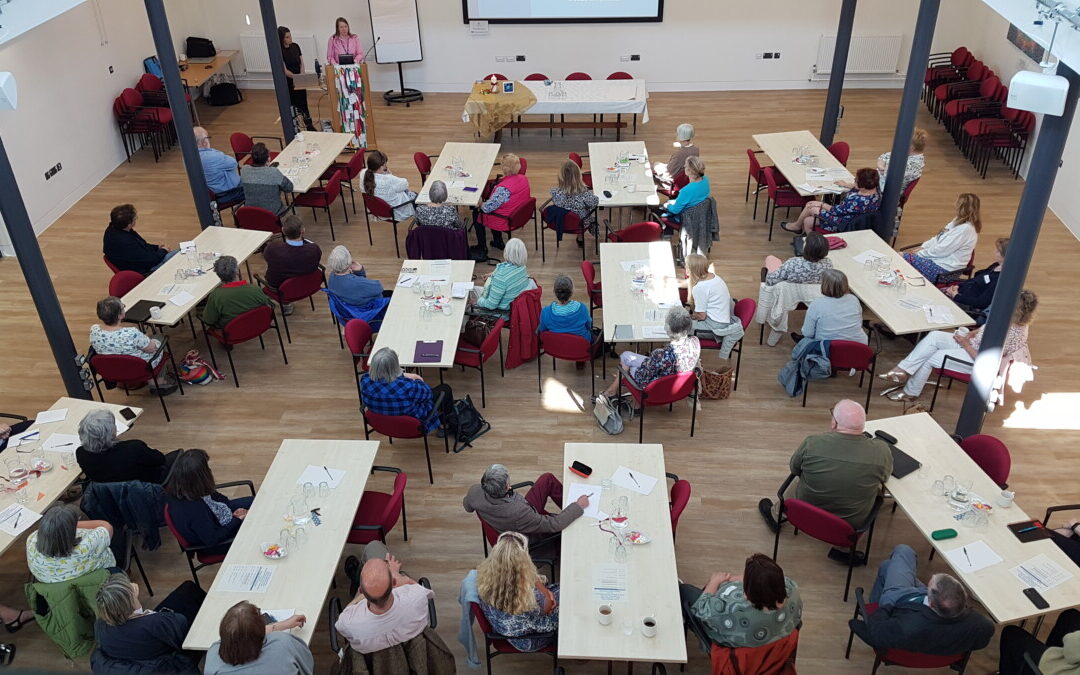The Diocesan Safeguarding Team held its annual Parish Safeguarding Representatives Conference at Buckfast Abbey on Saturday 13th May. It was attended by almost 40 of the Safeguarding Reps that volunteer in our churches across the diocese.
The day was opened by Fr Mark Skelton, the Clergy Lead for Safeguarding, with a scripture reading and prayer. The training for the day was provided by Vicky Brooks from the Trauma Informed Plymouth Network with support from Sophie Scagell, the Survivor Support and Communications Caseworker for the diocese. The training was called, “An Introduction to Trauma Informed Practice”.
The training started with a definition of trauma, “An event, series of events or set of circumstances that is experienced by an individual as physically or emotionally harmful or life threatening and that has lasting adverse effects on the individual’s functioning and mental, physical, social, emotional or spiritual well being”. Our Safeguarding Reps were then asked to consider the things that parishioners in their local parish may have experienced or be struggling with, for example: abuse, bereavement, experiences of war etc.
Vicky spoke about Adverse Childhood Experiences (ACEs) which are traumatic events that can have a negative and long term impact on a individuals health and wellbeing. She then talked about stress and the Five Stress Responses (fight, flight, freeze, flop and fawn) that we use when we feel in danger or afraid. The morning session concluded by looking at the responses that individuals can have to situations as a result of the trauma they have experienced.
At midday, of our Safeguarding Reps attended Mass at Buckfast Abbey. We then enjoyed an excellent lunch at the Abbey’s Conference Centre.
Sophie began the afternoon by talking about the LOUDfence that was held at Christ the King Church in Plymouth back in February. She gave a brief overview of the event and then shared some feedback that she had received from survivors about encounters with their fellow parishioners or with the clergy, when they had shared their experience of abuse. They felt that people often demonstrated a lack of openness to hearing about abuse, and were dismissive or appeared eager to end the conversation with them. They also shared that they felt the response from some to what they shared was one of disbelief, and they often did not feel that they were treated compassionately. Sophie explained that being heard, understood and believed is really important for a survivor, as it may have taken them years to find the courage to share what has happened to them.


(The first picture is of the LOUDfence from Christ the King church in Plymouth. The second picture is a display of LOUDfence ribbons and messages created by our Safeguarding Caseworker, Annette Moody-Burkinshaw.)
Our Safeguarding Reps were asked to think about whether there were any areas within their role or in the church that could inadvertently be harmful, and how things could be done in a more trauma informed way. A lot of feedback was provided by our Safeguarding Reps with many examples provided from their own experiences.
During the afternoon session Vicky shared some guidance from Operation Emotion (a Plymouth based charity that provides services for adult male survivors of sexual abuse) about responding appropriately to a disclosure:
- I believe absolutely everything you have told me.
- You are not alone – unfortunately this happens to many people.
- There is nothing wrong with you – what you are feeling is understandable in the context of your trauma.
- What happened to you was wrong and was not your fault.
- You were the victim of a serious crime and if you decide in the future to report this you can count on me to help you
- You can, with the right support, recover.
- When you are ready there is local help and I can help you find it.
The training concluded by looking at how our wellbeing can be impacted by work, our own life experiences or by witnessing/hearing about traumatic experiences. There were discussions about the signs of stress and the things that we can do to care of ourselves.
The final session of the conference was an open forum for our Safeguarding Reps to ask questions about their role, safeguarding processes etc. The day then ended with a prayer.
We are very grateful for the work that our Safeguarding Reps do as volunteers across our diocese to help keep our church communities safe. We welcome and thank all the Safeguarding Reps who have recently taken up this role in their church. We also especially thank our Safeguarding Reps who have been doing this role for a while. Some of our Reps have been in role for 5, 10, and 15 years or more, and we are very thankful to them for all of their hard work and dedication.

